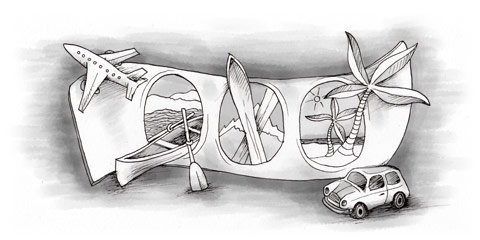In many towns, parking is permitted on one side of the street (the side with odd-numbered houses) for the first half of the month and on the ‘even’ side for the second half of the month. This is called stationnement alterné semi-mensuel and is shown by a sign. (Note that the French for ‘parking’ is stationnement; parking means ‘car park’.) Parking may also alternate weekly or daily; parking on alternate days is indicated by a sign stating ‘ Côté du Stationnement – Jours Pairs’ (even) or ‘ Jours Impairs’ (odd). In Paris, signs may indicate that parking is forbidden on one side of the street at certain times (e.g. for street cleaning).
On-street parking is forbidden in many streets in the centre of Paris and other cities. Parking is forbidden in Paris on main access routes, designated as red routes ( axe rouge). ‘ Stationnement interdit’ means parking is forbidden and may be accompanied by the sign of a ‘P’ with a line through it. No parking may be indicated by a ‘ Stationnement gênant’ sign with a picture of a lorry towing away a vehicle (if you park in a taxi rank or in front of a private garage, you’re likely to find your car towed away or your tyres slashed!) or by yellow kerb markings.
It’s forbidden to park in front of a fire hydrant. In Paris, it’s illegal to leave a car in the same spot on a public road for more than 24 hours. Parking a caravan on roads is forbidden at any time in Paris and some other towns and cities, and overnight parking in a lay-by isn’t permitted anywhere in France, although you can stop for a rest if you’re falling asleep at the wheel. On roads outside town limits, you must pull off the road to stop.
Blue Zones
In many cities and towns there are ‘blue zones’ ( zone bleue), indicated by blue street markings. Here you can park free for one hour between 09.00 and 12.00 and from 14.00 or 14.30 until 19.00 from Mondays to Saturdays, with no limit outside these hours or on Sundays and public holidays. Parking isn’t restricted between 12.00 and 14.00, meaning you can park free from 11.00 until 14.00 or from 12.00 until 15.00. You must display a parking disc ( disque de contrôle/stationnement) in your windscreen.
These are available free or for a small fee from garages, travel agencies, motoring organisations, tourist offices, police stations, tobacconists’ and some shops. Set your time of arrival in the left box, and the time you should leave by is displayed in the right box, e.g. if you set 10.00 in the left box, 11.00 is displayed in the right box. If you overstay your free time, you can be fined.
Ticket Machines
In most French cities, parking meters have been replaced by ticket machines ( horodateurs). If a parking sign has the word ‘ Horodateur’ beneath it or there’s a ‘ Stationnement payant’ sign, perhaps with ‘ Payant’ also marked on the road, it means that you must obtain a ticket from a nearby machine. Parking must usually be paid for between 09.00 and 19.00, although it’s free from 12.00 to 14.00 (even traffic wardens stop for lunch).
The cost is around €0.65 to €1 per hour (more at railway stations) and machines usually accept 5 cent, 10 cent, 20 cent, 50 cent, €1 and €2 coins. In some towns the first 30 minutes is free, one hour costs €0.30, 90 minutes €0.65 and two hours (often the maximum period) €1.55. Buy a ticket for the period required and place it behind your windscreen where it can be seen by a warden.
Car Parks
There are car parks ( parking) in cities and towns, where parking rates vary from €0.30 to €2 per hour or €2.50 to €15 for 24 hours. Car parks in central Paris charge €1.50 to €3 per hour and €12 to €20 for 24 hours. Long-term parking, e.g. at railway stations, is available in most towns for up to €10 for the first 24 hours with a reducing scale thereafter.
Monthly tickets can be purchased, reducing your parking expenses if you park frequently. On entering most car parks, you take a ticket from machine (usually you must press a button). You must pay before collecting your car, either at a cash desk ( caisse) or in a machine and cannot pay at the exit. Machines may accept coins and banknotes, e.g. €5, €10 and €20, and debit and credit cards. After paying, you usually have around 15 minutes to find the exit, where you insert your ticket in a machine and hope the barrier rises.
Discounts
In most cities, local residents can pay reduced parking fees by obtaining a permit from the local town hall. This must be affixed to the right-hand side of your windscreen. Subscription cards for ticket machines are also available for residents and commuters in most cities. Disabled motorists are provided with free or reserved parking in most towns, shopping centres and at airports, but they must display an official disabled motorist’s badge ( macaron) inside their windscreen.
These are free but can take two months to obtain. Apply with your carte d’invalidité to the Commission d’Education Spécialisée (CDES) if you’re under 20 or the Commission Technique d’Orientation et de Reclassement Professionnel (COTOREP) if you’re over 20. Disabled drivers can also obtain a European parking card ( carte européenne de stationnement) entitling them to disabled parking privileges throughout Europe.
Fines
Fines for illegal parking are based on the severity of the offence. Throughout France you’re fined around €11 for not paying or for overstaying your time in a legal parking spot, which increases to €33 if the fine isn’t paid within three months. Fines for illegal parking are €35, €68 or €135, which increase to €75, €180 and €375 respectively if they aren’t paid within three months.
Parking fines can often be paid by buying a fiscal stamp ( timbre fiscal) from a tobacconist’s and affixing it to the notice that’s sent to the relevant authority. Since January 2006, it has been possible to pay them online – a scheme set to be extended to the whole country by the end of 2007. You can usually agree a payment schedule for a large fine, rather than pay it in a lump sum. If your car is given a ticket ( papillon) and isn’t moved within an hour, it will be given a second ticket and after two hours a wheel clamp may be fitted or it may be towed way.
Paris has six car pounds ( fourrière) and in addition to a parking fine of between €35 and €135 you must also pay a fee to release your car from a pound (or to have a clamp removed), plus a daily storage charge. However, if you don’t collect your car within 10 to 45 days it may be sold (so don’t park illegally before taking a long trip abroad!). Most pounds are open from around 08.00 to 20.00 Mondays to Saturdays.
Paris
Parking in Paris is usually nothing less than a nightmare. Parisians are parking anarchists and are world champions at the art of creative parking (you will often see cars parked millimetres apart and even a number of cars squeezed into a single space!). Parking on street corners and even on pavements is a favourite sport. Note, however, that if you park illegally, you aren’t covered by comprehensive insurance should your car be damaged (which is highly likely). Needless to say, car parks are expensive. They’re also often full. When visiting Paris, use public transport, which is cheap and efficient.
This article is an extract from Living and working in France. Click here to get a copy now.


